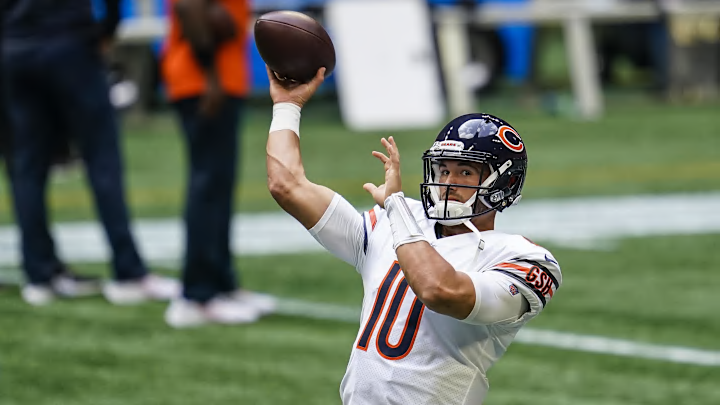
Chicago Bears reach playoffs twice with Pro Bowler Mitchell Trubisky
It's not rare for a top-two overall pick to join a franchise in a state of turmoil, and Trubisky was no exception. With the team signing Mike Glennon to a fairly large contract before the start of the draft, Trubisky competed with the veteran for the starting quarterback position throughout camp. Trubisky played well in the preseason, but Glennon was named the starter for the team's first regular season game.
After starting the year with a 1-3 record, head coach John Fox elected to replace the veteran with the second overall pick rookie, and Trubisky made his debut against the Minnesota Vikings on Monday Night Football. The Bears would go on to lose a close game, but Trubisky played fairly well in his first start to the tune of 126 yards and a touchdown on 12 completions.
Slowly, Trubisky got the handle of the offense and helped the team string a couple of wins together before ending with a 5-11 record. Trubisky went 4-8 as the starter and finished his rookie campaign with over 2,000 yards, seven touchdowns, and seven interceptions. However, the team's and offense's struggles were not solely on Trubisky's shoulders, as the offense specifically lacked serious talent (guard Kyle Long was probably the best player on the unit).
The team decided to make a change at head coach during the offseason, replacing a defensive-minded Fox with an offensive-minded Matt Nagy. The main focus then became adding talent around Trubisky, and the team turned around and signed Allen Robinson and Taylor Gabriel, and added Anthony Miller in the second round of the ensuing draft. They also solidified the defensive side of the ball, adding Roquan Smith at the top of the draft and trading for Khalil Mack days before the start of the regular season.
The additions to the team made life easier for all players, especially Trubisky. Despite missing two games near the end of the year due to injury, Trubisky finished his second season with over 3,600 total yards and 27 touchdowns. The team finished with an impressive 12-4 record, a total strong enough for a first-place division finish, and Trubisky went 11-3 as a starter.
His best game of the season, and perhaps of his career, came early against the Tampa Bay Buccaneers, where Trubisky finished with six passing touchdowns and zero interceptions en route to becoming one of just three players in franchise history to reach that total alongside Sid Luckman and Johnny Lujack.
During the ensuing Wildcard game against the Philadelphia Eagles, Trubisky played extremely well despite the outcome. In his postseason debut, Trubisky finished with over 300 yards and a touchdown, including leading the team down the field to set up for a potential game-winning field goal. Of course, the kick did not go through and the Bears lost, but Trubisky showed that he had it in him to complete some big throws when it matters most. Following the season, Trubisky was named to his first Pro Bowl.
The following year, expectations were high for both Trubisky and the team as a whole. With a top defense, the offense did not have to light up the scoreboard to win games but unfortunately, the team ended the season with an 8-8 record. Trubisky missed one game during the season and led the team to all eight wins throughout the season, but his production and efficiency both dropped slightly. His touchdown-to-interception ratio dropped from 24-12 in 2018 to 17-10, and his completion percentage fell from ~67% to ~63%.
Heading into the final year of his rookie contract, Trubisky was someone on the proverbial "hot seat" as an NFL starting quarterback. Much of this pressure was sadly unrelated to Trubisky himself, and more aimed at the quarterbacks that the Bears could have drafted, specifically Patrick Mahomes and Deshaun Watson. Despite generally being a higher-ranked prospect than both players (albeit, according to various websites and analysts and not the teams themselves), the Bears seem to be mocked for the selection of Trubisky, when they were not the only team to pass on two very talented quarterbacks.
Nonetheless, Trubisky aimed to prove himself a starting quarterback in this league during his fourth season, and he was able to take the team to the playoffs for the second time in three seasons. Trubisky had to fight the recently acquired Nick Foles for time with the starting offense, but in his nine starts, the former Tar Heel led the team to a 6-3 record. Trubisky finished the year with 16 touchdowns and eight interceptions, matching his career-high touchdown to interception ratio from his Pro Bowl season.
In the ensuing Wildcard matchup versus the New Orleans Saints, the Chicago Bears were simply outmatched by a more talented team. Despite the additions of talented skill players in Darnell Mooney and David Montgomery, the Saints held the Bears offense to just nine total points, six of which came in the final seconds of the game, where Trubisky hit Jimmy Graham for a touchdown. The game was historic as it was the first time an NFL playoff game was aired on Nickelodeon, and the event future an "NVP" award, which Trubisky was awarded after the loss thanks to some light social media trolling.
